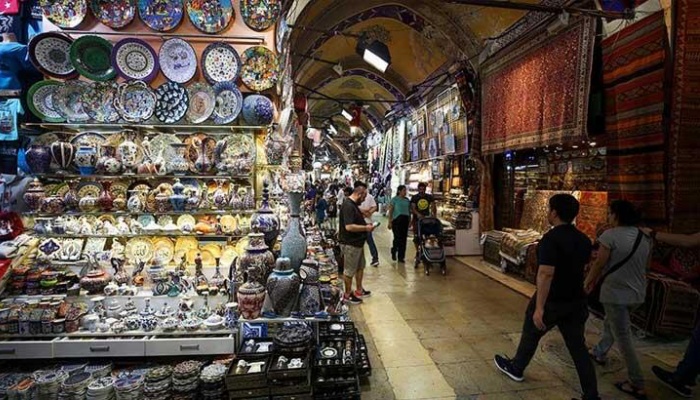İstanbul’s historic Grand Bazaar, home to almost 3,000 shops that employ some 30,000 people, is preparing to reopen on Monday after a two-month closure due to the global coronavirus outbreak, AFP reported.
Officials say it has been the longest closure in the bazaar’s more than 550-year history, except for forced shutdowns following fires and earthquakes.
The market is usually visited by 150,000 people every day — and by 42 million last year — while traders shout out deals in dozens of languages to lure tourists into their stores.
Now the stores are all shuttered, except for about 20 stock exchange offices and jeweler’s shops that have remained open for economic reasons, with only special customers received by appointment.
The bazaar has been disinfected every Wednesday during the shutdown, while janitors have cleaned every morning.
According to some reports, the bazaar was one of the hubs for spreading the coronavirus in İstanbul, with 44 people working there dying from the virus.
“God willing we will reopen our market in a healthy fashion on June 1,” Fatih Kurtulmuş, chairman of the Grand Bazaar’s board, told AFP in an interview.
“I have faith that our country will begin receiving tourists from mid-June by paying attention to hygiene rules,” he said inside the historic market.
Kurtulmuş added that while not much activity is expected in the first weeks, “I believe tourists will fly to İstanbul by the end of June because they cannot do without … the Grand Bazaar, Hagia Sophia and the Blue Mosque.”
The bazaar is located on İstanbul’s historic peninsula, home to the Sultanahmet Mosque, also called the Blue Mosque, and the ancient church-turned-mosque-turned-museum Hagia Sophia.
The Grand Bazaar was built in 1455, two years after the Ottomans seized Istanbul — then known as Constantinople — from the Byzantines.
The market thrived, expanding rapidly with the rising Ottoman Empire, and by the 17th century it had taken on its current shape, giving the bazaar its Turkish name Kapalıçarşı (covered market).



